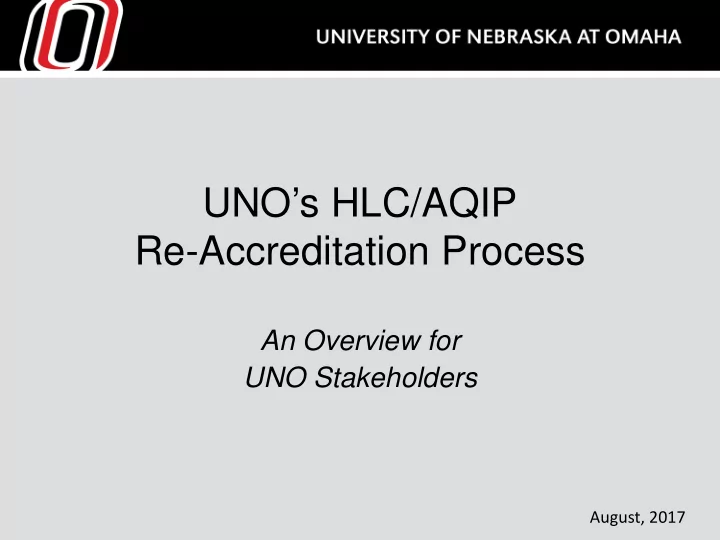

UNO’s HLC/AQIP Re-Accreditation Process An Overview for UNO Stakeholders August, 2017
UNO’s Institutional Accreditation • UNO has been continuously accredited by the Higher Learning Commission since 1939 • Higher Learning Commission (HLC): – One of six regional accrediting bodies for post-secondary degree- granting institutions in the nation – Covers a 19 state region, ranging from Illinois to Colorado, and Wyoming to Arizona
Institutional Accreditation vs. Program-specific Accreditation • HLC accreditation covers the entire institution and includes all academic programs • In addition, many specific degree programs have sought and been awarded their corresponding discipline-based, program-specific accreditation (for example, Social Work is accredited by the Council on Social Work Education (CSWE), and Chemistry is accredited by the American Chemical Society (ACS)) • Both institutional and program-specific accreditation support quality through adherence to rigorous standards
Pathways to Institutional Accreditation • HLC has 3 pathway options (with slightly different requirements and schedules) • UNO is on the AQIP Pathway (Academic Quality Improvement Process) • AQIP focuses on Continuous Improvement (with heavy emphasis on assessment, data, review, decision- making, program enhancement)
UNO’s Re-accreditation, Schedule-Wise – 2017-18 is year 8 of an 8-year cycle for UNO – Various reports and supporting evidence are being submitted this year – A campus visit will take place in March
Why is Institutional Accreditation Important? • Accreditation provides public accountability, serving as higher ed’s primary mechanism to demonstrate quality • Accreditation is closely tied to federal government oversight. Participation in the federal financial assistance program requires institutional accreditation • Transfer of credit generally requires institutional accreditation • Most graduate programs require a student’s undergraduate degree to be from an accredited institution
Institutional Re-accreditation Encompasses • Meeting all of the standards outlined within: – AQIP categories/sub-categories – HLC criteria/core components – Federal Compliance requirements – Assumed Practices • And, for all AQIP items, provision of evidence/documentation regarding: – Policies/procedures/programming – Assessment processes – Actual data – Data review process – Improvements/program changes based on data
Examples of Assessment in Place at UNO that Cross Programs • Academic Program Review • Program-specific Accreditation • End-of-Program Student Learning Outcomes • Gen Ed Student Learning Outcomes • Collegiate Learning Assessment (CLA+) • New Student Wellness Survey • National Survey of Student Engagement • ‘Your First College Year’ Survey • Post-Graduation Plans Survey
AQIP Categories/Sub-Categories (22) • Helping Students Learn • Planning and Leading – Common Learning Outcomes (gen ed) – Mission and Vision – Program Learning Outcomes – Strategic Planning – Academic Program Design – Leadership and Governance – Academic Program Quality (across all modalities) – Organizational Integrity – Academic Integrity • Knowledge Management and Resource Stewardship • Meeting Student and Other Stakeholder Needs – Knowledge Management – Current and prospective students’ need – Resource Management – Retention, persistence, completion – Operational Effectiveness – Key stakeholder needs (alumni, community) – Complaint processes • Quality Overview – Collaborations and Partnerships – Quality Improvement Initiatives (CQI) – Culture of Quality • Valuing Employees – Recruiting, hiring, orienting – Employee evaluation and recognition – Professional development and support
HLC Criteria/Core Components (21) • Mission • Teaching/Learning: Evaluation and Improvement – Broadly understood – Demonstrate responsibility for quality of ed – Articulated publicly programs (program reviews) – Diversity – Demonstrate commitment to ed achievement – Public Good through ongoing assessment of student learning – Demonstrate commitment to ed improvement • Integrity, Ethical, Responsible Conduct through ongoing attention to retention, persistence, completion – Financial, academic, personnel, auxiliary – Transparency, honesty – Board is sufficiently autonomous • Resources, Planning, and Institutional – Freedom of expression, pursuit of truth Effectiveness – Research, scholarly practice, etc., – Institution’s resource base supports current programs and plans for maintenance and strengthening • Teaching/Learning: Quality, Resources, – Governance and administrative structures Support promote effective leadership and collaborative processes enabling to fulfill mission – Degree programs appropriate to Higher Ed – Institution engages in systematic and integrated – Demonstrate intellectual inquiry is integral planning – Has the needed faculty, staff for effective, high quality programs and services – Institution works systematically to improve its performance – Support for student learning, effective teaching – Fulfill claims for enriched educational environment
Federal Compliance Requirements • Assignment of Credits, Program Length, and Tuition • Institutional records of Student Complaints • Publication of Transfer Policies • Practices for Verification of Student Identity • Title IV Program Responsibilities • Required Information for Students and the Public • Advertising and Recruiting Materials and Other Public Information • Review and Publication of Student Outcome Data • Standing with State and Other Accrediting Agencies • Public Notification per Opportunity to Comment • Competency-Based Programs including Direct Assessment Programs / Faculty-Student Engagement
HLC’s Assumed Practices • Integrity -- Ethical and Responsible Conduct • Teaching and Learning -- Quality, Resources, Support • Teaching and Learning -- Evaluation and Improvement • Resources, Planning, and Institutional Effectiveness
Thanks! Your involvement, buy-in, and cooperation is much appreciated, highly valued, and critical for a successful re-accreditation
Recommend
More recommend